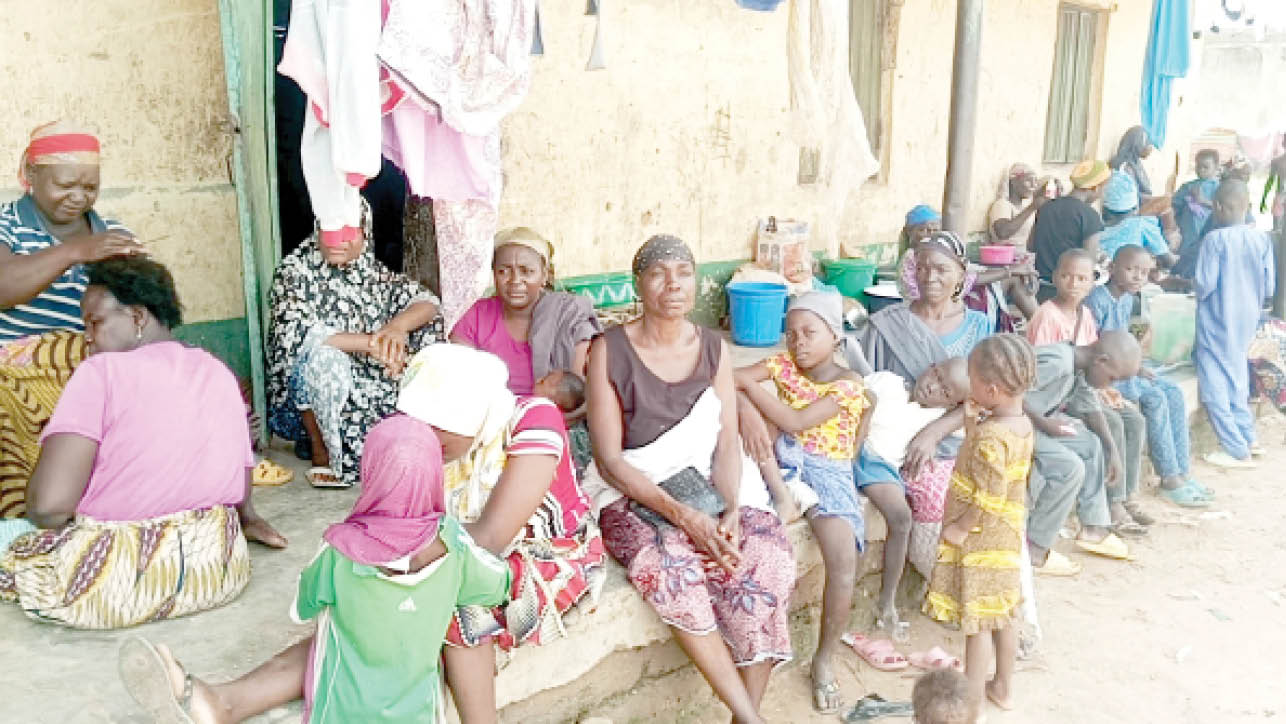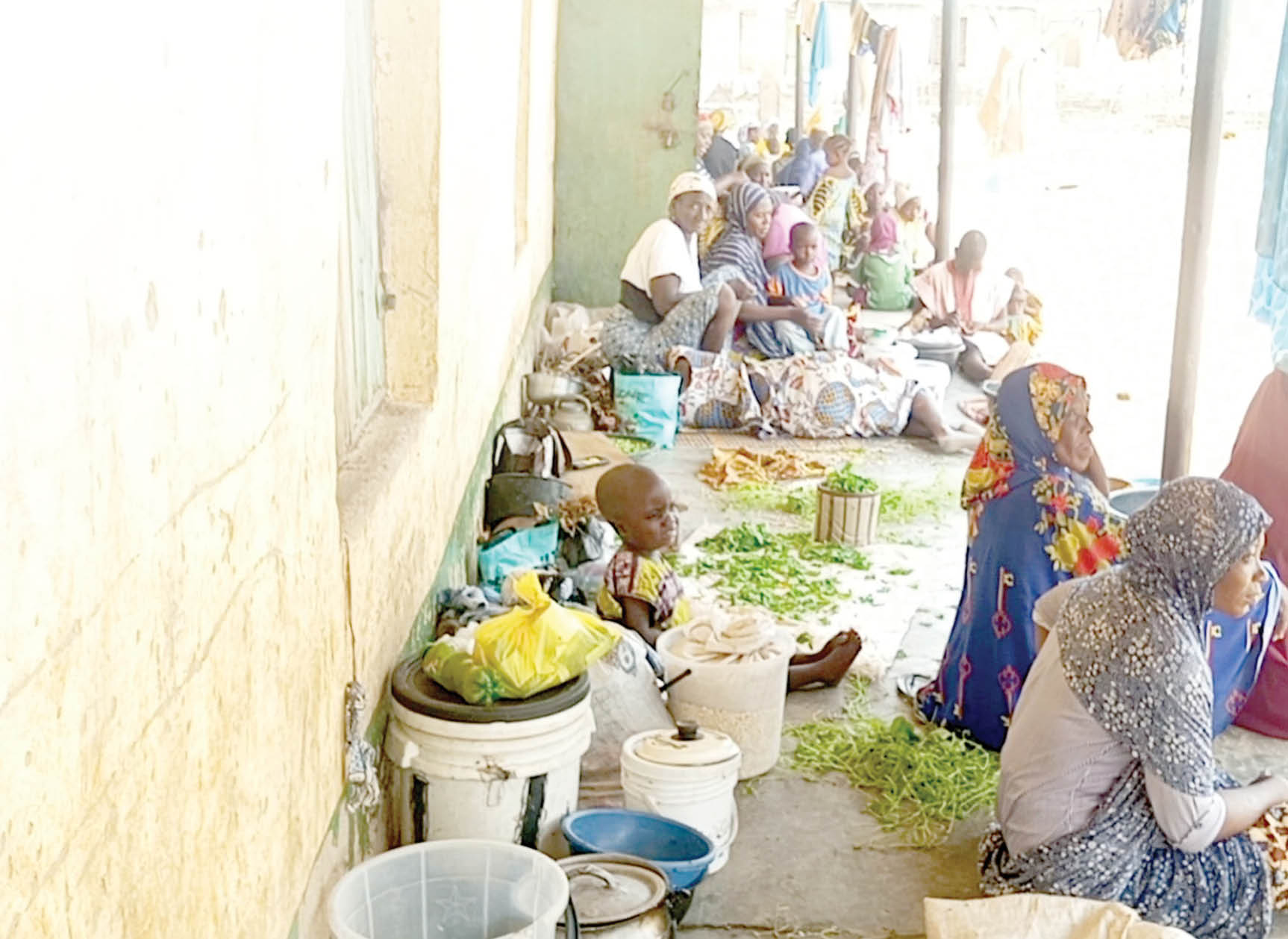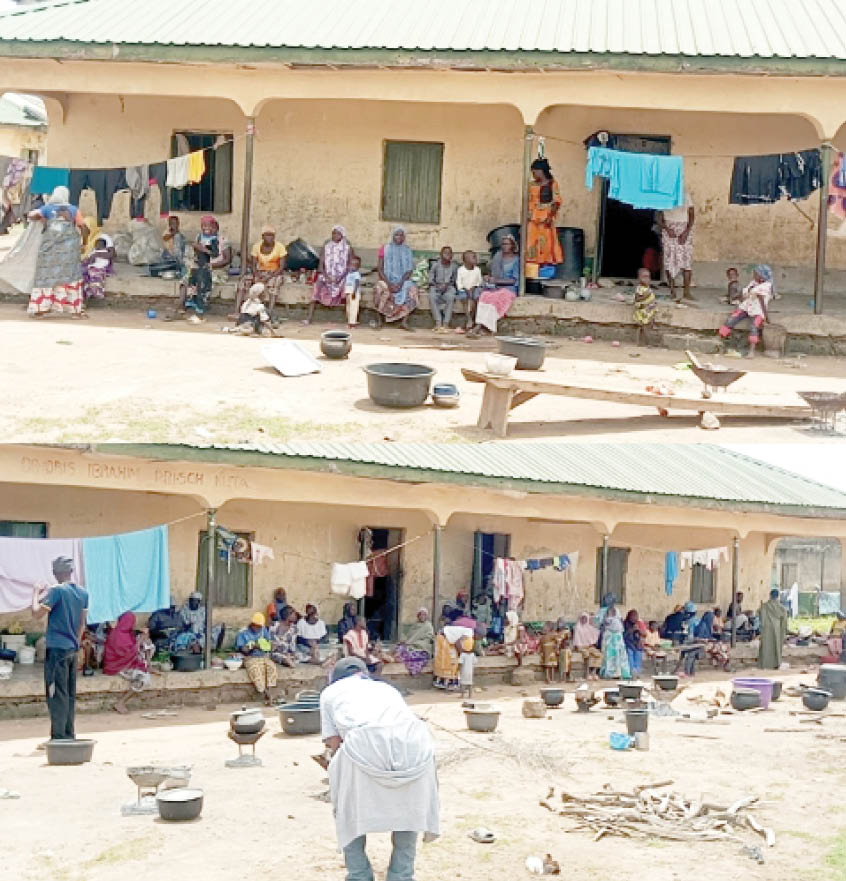Inside story of displaced persons of Niger State
On August 16, 2024, some displaced farmers from Allawa, an agrarian community in Shiroro Local Government Area of Niger State, raised alarm that bandits and terrorists moved into their houses after they were displaced, growing crops on their farm lands. The farmers also told Weekend Trust that the fertilizers they kept in their rooms in […]

idps at kuta camp, shiroro lga of niger state1
On August 16, 2024, some displaced farmers from Allawa, an agrarian community in Shiroro Local Government Area of Niger State, raised alarm that bandits and terrorists moved into their houses after they were displaced, growing crops on their farm lands.
The farmers also told Weekend Trust that the fertilizers they kept in their rooms in preparation for this year’s rainy season before they were displaced following the withdrawal of soldiers from their community were being used by the bandits on the crops they had grown.
Daily Trust had reported how hundreds of Allawa residents and adjoining communities fled on April 25, 2024, following the withdrawal of soldiers from the community after two separate attacks that led to casualties on the side of the security forces.
Niger State Commissioner for Homeland Security, Brigadier General Bello Abdullahi Mohammed (RTD), while confirming the withdrawal in April this year said the decision was administrative by the military authority to restrategise to defeat the bandits and terrorists in the area.
- Column No.6: Food prices, and other Nigerian horror stories
- Insecurity and the food crisis in northern Nigeria
“The whole thing is about administrative arrangements by the military to re-strategise to return in full strength,” Mohammed said in a text message he sent to our correspondent.
The withdrawal of soldiers in April this year came days after two military officers and a vigilante lost their lives in an ambush while responding to a distress call of multiple attacks on Roro, Karaga, Rumace and other farming communities in the area.
Days after the ambush, a military vehicle also unknowingly drove on an Improvised Explosive Device (IED) on Allawa-Pandogari Road, leading to casualties.
Residents told our correspondent that since the departure of the troops, Allawa and several other communities have been taken over by two different terrorist groups who are now growing crops on their farm lands, saying the terrorists also sleep in their houses.

Ibrahim Muhammed Gando Allawa, Chairman Allawa Eagle Eye Forum, confirmed to Weekly Trust that since the withdrawal of troops, residents have not returned home because of fear, saying that some people who fled since April were in Erena, Gwada, Kuta, Minna, Pandogari and other places.
“They (terrorists) are now sleeping comfortably in our rooms. They even have the courage to plant crops in our farm lands by forcing the people of neighbouring villages under their control, using the fertilizers we left behind,” he said.
He said no fewer than 15 communities are under the control of the Layi and Kacalla-led terrorists’ group.
He said the communities include Allawa, Jalako, Bassa, Kurebe, Madaka, Lukope, Wutare, Maganda, Gyaramiya, Samunaka, Tegina-kabata, Gagahuna, Makuba, Unguwar-Usman, among others.
He also said more than 12 other communities including Sabon Gari, Kwaki, Chukuba, Erena, Unguwar Matazu, Bataro, Iburo, Kudodo, Mai-komo, Unguwar-Madi, Ajatayi and Ajayi, are under the control of the Dogo Gide-led bandits’ group.
However, Abdullahi Suleiman Erena, the Spokesperson and Chairman of Security Committee of Lakpma Youth Forum, in a statement marking this year’s International Day of Youth, said over 500 villages have been burnt down by bandits and terrorists in the Lakpma axis of Shiroro Local Government Area in the last 10 years.
Checks by Weekend Trust revealed that the communities sacked in Allawa ward are Gyaramiya, Unguwar-sarkin-Noma, Kaliya-pangu, Maganda, Samunaka, Tegina-gaude, Yelwa, Jeloko, Bataron jatau, Bataron-sarki and Buduwi, among others.
Similarly, in Bassa/kukoki ward, the communities sacked are Roro, Unguwar-usman, Polwaya, Karaga, Kemaka, Gwadara, Rumace, Zangoro, Kyaruwa, Masuku, Kukoki, Agwaja and Rumace-gari, among others.
Residents said the displaced communities produce maize, millet, white sorghum, soya beans, yam and cocoyam in commercial quantities which attract buyers, even from outside Nigeria.
A resident told our correspondent that the insecurity led to the closure of many rural markets, including Allawa market, Bassa market, Kukoki market, Madaka market, Kurebe market, Kwaki market, Gurmana market, Manta market, Magami market and Kushaka market in Shiroro and Rafi LGAs.
He said the affected markets had served as epicentres of trading in farm produce with buyers coming from all walks of life, especially yam traders who usually come from Lagos and other western and eastern parts of Nigeria.
“The only alternative market where we now go to buy and sell is Erena market, and because of damages done to us, many of us don’t even have the means to buy inputs this rainy season. Our yam barns, including the yams we reserved to plant this rainy season, were burnt by bandits,” he said.
Speaking with Weekend Trust, Abba Usman Allawa, whose mother and sister were among the 26 women kidnapped since February, said living outside their ancestral homes has been very traumatic due to lack of basic needs, especially food and water.
He said the terrorists recently called for negotiation to allow them return to their communities, but they declined because of their previous experiences when after negotiating with them, they still returned to attack them.
Usman told Weekend Trust that the kidnappers recently sent a video to them to confirm that their women were still alive but would not be released until ransom was paid.
“My mother and sister were kidnapped along Allawa-Pandogari Road two months before we were displaced. It’s been seven months since the incident and they are still in captivity. We have tried several times to let the Niger State and federal government know that our women are still in captivity. The kidnappers asked us to pay huge amounts of money that we couldn’t afford. They said for each woman, we should bring five motorcycles, and the kind of motorcycles they demanded for cost N2 million each.
“When we pleaded that we didn’t have the money to buy those motorcycles, they told us to leave the women with them. So, we don’t even know what they’ve been doing with our women for the past seven months. We are appealing to the state and federal governments to take action. These women are people’s mothers; some of them were pregnant while some had babies with them when they were kidnapped. We don’t know our fate now in the hands of these terrorists and bandits,” he said.
Also speaking, Amina Hashimu said they now survive on artisanal mining despite the risks involved.
“We have spent five months outside our homes. Before we finally left our community, we were attacked several times. One night, we were asked to flee because terrorists were coming. Many of our people were killed on their way to markets, farms and even at home. Many women are currently in captivity. When we fled, we couldn’t take our food along with us to the IDP camps. Some pregnant women gave birth on their way to IDP camps and some newly born babies died on the way because of thirst and lack of water.
“Don’t we have a government in this state and country? Our leaders should pity the poor. During elections, they looked for us to vote for them but now, they no longer care about the problems we are facing. After the election, they only protect their families, leaving us to suffer in the hands of terrorists,” she said.
Hashimu said due to overpopulation in the IDP camps in Erena, Gwada, Kuta and Pandogari, 30 of them including children were forced to rent two rooms at Gidan-Mangoro – a suburb of Minna at the cost N10, 000 per month.

“Farming is more profitable for us than artisanal mining. With mining, we don’t get as much as N2, 000 in a day. If the government can provide us with security, we will prefer farming to artisanal mining,” she said.
The Deputy Chief Imam of Allawa, Mallam Mohammed Musa, said he wrote to the appropriate authorities, including the state governor on the plight of communities in Shiroro LGA, saying that no proper measure has been taken to enable them go back home to engage in farming.
“Recently, because of the hardship in IDP camps and other places where we have rented houses to stay, we went to Allawa to check if the community is now safe for us to go back. Those we sent narrowly escaped. When they came back, they told us that bandits had burnt down most of our houses while they were living in some.
“Is the government not aware of this because we haven’t seen any positive measure from the government against these terrorists and bandits. If bandits and terrorists can freely cultivate lands, it means there is no security in Niger State,” Musa said.
Similarly, a patent medicine shop owner, Abdullateef Saeed Bissala, said he was left with artisanal mining and menial jobs at the Kure Ultra-Modern Market Minna for survival after terrorists invaded the community and looted his drug shop from where he made a living in addition to farming.
“The situation is currently bad for us; we are struggling to find what to eat and where to live. We are not used to staying in cities and towns. So, this life is entirely new for us. When I was in Allawa, I owned a drug shop where I used to make up to N20,000 daily. I’m also a farmer but our farm lands have been taken over by terrorists and our houses have been destroyed and all our valuables looted,” he explained.
Kuluwa Musa, a yam trader from Allawa community, told our correspondent at the mining site that 29 of them sleep in a room and parlour in Minna, saying that they pay N10,000 monthly.
Residents told Weekend Trust that the Gyaramiyan bridge, which connects Pandogari-Allawa had been destroyed by the terrorists, making security intervention nearly impossible.
Recently, terrorists opened fire on Internally Displaced Persons struggling to get money to buy food at a mining site at Anguwan Mai-Giro. At least, 10 lives were reportedly lost while many sustained injuries.
The acting governor, Yakubu Garba, said the state government would ensure that perpetrators are made to face the law, while noting that insecurity was hampering the agricultural revolution of the current administration.
He confirmed that many farmers had been chased out of their communities by terrorists and bandits, saying that the government was doing everything possible to tame the tide of attacks on farming communities in the state.
The Director of Media and Strategy, Niger State Ministry of Humanitarian Affairs and Disaster Management, Habibu Wushishi, told Weekend Trust that no fewer than 12 villages were displaced following the last Wednesday attack on a mining site at Anguwan Mai-Giro, in which 13 lives were lost.
“Thirteen persons were confirmed dead with many injured but there was no case of abduction. Residents from over 12 villages are currently in Erena IDPs camp with their numbers yet to be ascertained,” Wushishi said.
The spokesperson of the Niger State Police Command, SP Wasiu Abiodun, said security agencies have not rested on their oars in ensuring that the displaced persons are returned home.
“We are working with the military in line with the government’s effort to ensure that all displaced victims return to their villages, as counter-insurgency operations are ongoing in those areas,” he said.
